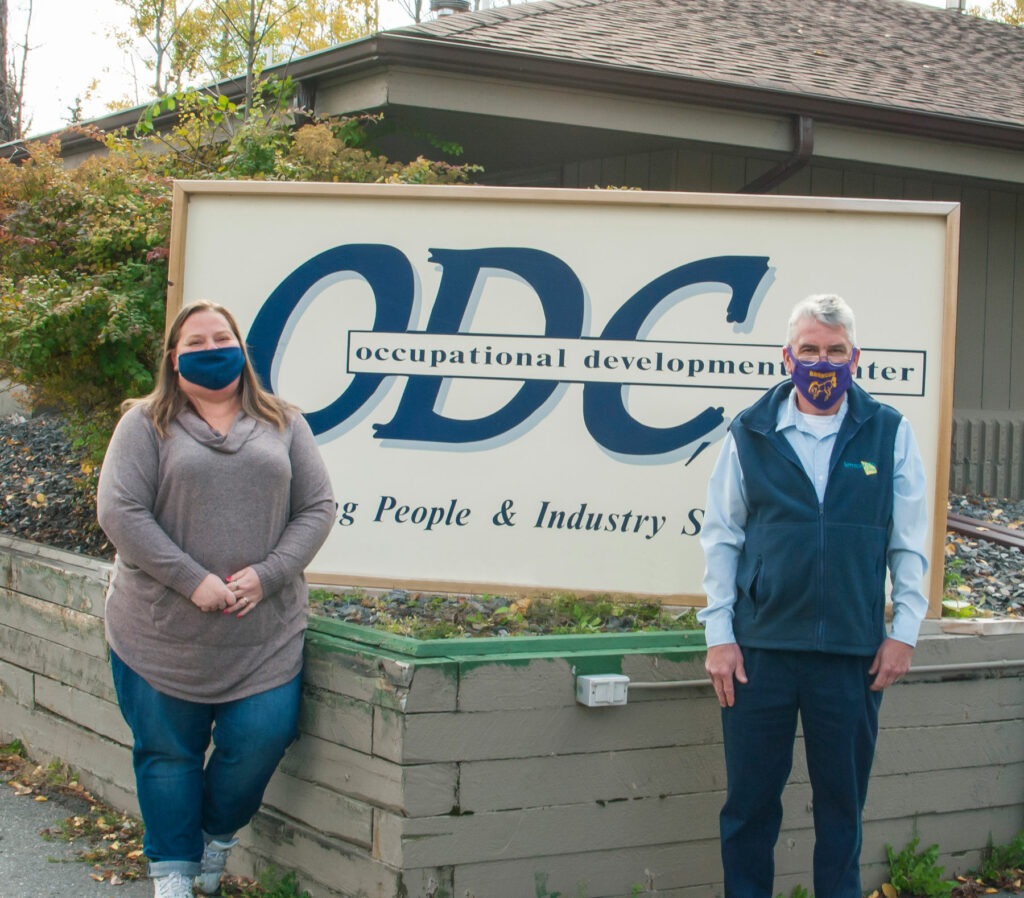
ODC and ServiceMaster enter mutually beneficial partnership for guaranteed workforce
A recent partnership forged between the Occupational Development Center (ODC) and ServiceMaster in International Falls and Baudette will provide a precedent for future alliances as services provided transition from center-based to community-based employment.
BACKGROUND
Recent regulatory changes have made it so disability service providers cannot be both the employer and evaluator when it comes to providing job training services. This is driven by recommendations of the Minnesota Olmstead Plan, which was approved in 2015. Industry adaptations on this scale require not just a reconfiguring of program structure and outcomes, they also require a sea change in mindsets for both program staff and people served.
ODC has been proactive in making the transition to community-based employment through updating its staff training programs and job descriptions, along with assertively pursuing employer partnerships in the communities the organization serves across northern Minnesota.
This partnership with ServiceMaster represents a concrete case study for how relationships between employers and ODC can be modeled in other communities and across businesses in various industries.

OPPORTUNITY
Earlier this year, while reviewing ODC’s janitorial service contracts, an opportunity to create a mutually beneficial situation with a competitor revealed itself to MaryBeth Gibson, program specialist for both the International Falls and Baudette ODC locations. She reached out to Todd Coulombe, owner of ServiceMaster, in the beginning of July.
“I didn’t even have to sell it to Todd,” MaryBeth said. “It was a brief conversation over the phone about, ‘Hey, you can have these contracts and I’ll supply you employees,’ and he said, ‘Yeah, I’ll think about it.’”
A few days later he returned her call with some good news.
“Todd called back and said, ‘Yeah, we’re interested in doing that. What do you think?’” MaryBeth continued. “Having an employer come in and say — yeah, I see your vision too and yeah, we can totally do that — it was a dream come true!”
Fourteen employees were placed onto the ServiceMaster payroll starting Oct. 1, with ODC handling all job training and supports. Because ODC clients were already familiar with the sites in the contracts that ServiceMaster took over, the transition was seamless.
“I just think it’s an exciting thing to team up with ODC,” Todd said. “We’re looking forward to what opportunities this will present for other employers. It’s going to be good for this community.”
Some clients were nervous that they wouldn’t be working for ODC anymore. Marilyn Napper, Employment Specialist at Int’l Falls ODC, made an event of the onboarding process with ServiceMaster — complete with balloons, cupcakes, sandwiches — while Todd sat down with each individual to complete their employment paperwork. “She helped to create this celebratory atmosphere to show that this was a positive move,” MaryBeth shared.
“We’re waiting for their work uniforms right now,” she continued. “For a lot of our clients, that will bring a sense of pride — to be able to wear the ServiceMaster logo, become a part of the company and build that employer relationship.”
BENEFITS
How this employer-provider relationship works is simple: a community employer adds a new employee or group of employees from ODC onto their payroll, and ODC provides all supervision, accommodation, interventions and job training required.
The benefit to employers is that they gain dedicated and eager employees with any training or supervisory needs provided by ODC. And the benefit to ODC clients is that they are earning competitive wages, becoming part of a larger team, and pursuing independent employment in the community.
These relationships are managed between the employer and ODC employment specialists — in this case, Todd and Marilyn work in close communication to ensure things are running smoothly. Any issues that arise are communicated via job coaches, who act as on-site supervisors.
A major benefit to ServiceMaster in this partnership is that they now have “a workforce tool that isn’t available in the wider community: an on-demand workforce,” MaryBeth explained. “We have all of these people who want to work so bad, and we just don’t have enough community employers that have recognized the benefits of this loyal and eager employment pool.”
Having this on-demand pool of employees works well for ServiceMaster as it means that shifts will never run short of staff. These employees are interchangeable because they’ve all received the same training and know the sites and routines.
Other employers who work with ODC enjoy having clients working on-site because customers will come in specifically to interact with them. “There are customers that would only shop certain days to see our clients,” MaryBeth said. “So there was a huge social aspect as well as the working aspect. And our employers saw that benefit for these individuals.”
ServiceMaster took on 14 employees of all different levels of mental and physical disabilities, some of which may only include conditions like high anxiety. “Something so simple, but they can’t work without that added support,” MaryBeth explained. “Accommodations don’t necessarily affect productivity.”

MODEL FOR SUCCESS
A hesitation for some employers is the inability to see how these partnerships can work when presented abstractly, or they don’t know how they can apply it to their business model.
“There’s a fear of the unknown, an uncertainty of how to adapt to each individual person’s needs,” MaryBeth stated. In this partnership model, ODC takes on the job of accommodating and training employees: taking these uncertainties out of business owners’ hands. “If it means another employee has been successfully placed, ODC is committed to supporting them,” she added.
Julie Bartkowski, an ODC board member and mother of Jared, an ODC client and one of the 14 employees that ServiceMaster has taken on, is optimistic for future partnerships that will help others like her son.
“As an organization that is always looking out for the benefit and growth of their clients, this opportunity really serves both of these purposes,” Julie said. As a parent, she acknowledged a common struggle for children or people being cared for becoming stagnant or feeling stuck. “This is a great opportunity for them to continue to expand their skills and involvement in the community. To keep moving forward.”
MaryBeth plans on utilizing this same employment model in Baudette, where ODC employment services are completely community-based. “The Kaleidoscope Thrift Store is now being run as an integrated work site,” she said, adding that ServiceMaster has sites in this community that are being developed for ODC client placement as well.
“We are looking forward to establishing a new partnership with ServiceMaster through ODC and am happy that they are bringing their services into our community,” said Amy Ballard, LOW County Social Services Director. “Our persons served will definitely benefit from this work relationship.”
ServiceMaster has been serving the International Falls and Baudette communities for 41 years; Todd and his family purchased this franchise five years ago. He has no hesitation in recommending ODC for potential partnerships with other franchises and would act as a resource for other business owners curious to learn more. “These individuals are so proud of what they do, want to work, and have been so dependable and reliable,” Todd said. Qualities that employers may have struggled with identifying in the wider employment pool in recent years.
“Which is what is so exciting about this partnership: it’s a way to show other employers how these relationships can work for mutual benefit,” MaryBeth explained. “For our people served, the only thing that changes is where the paycheck comes from. ODC clients still get the same supports provided by their job coach, and the work still gets done. It’s a win-win for everybody.”
Leave a Reply